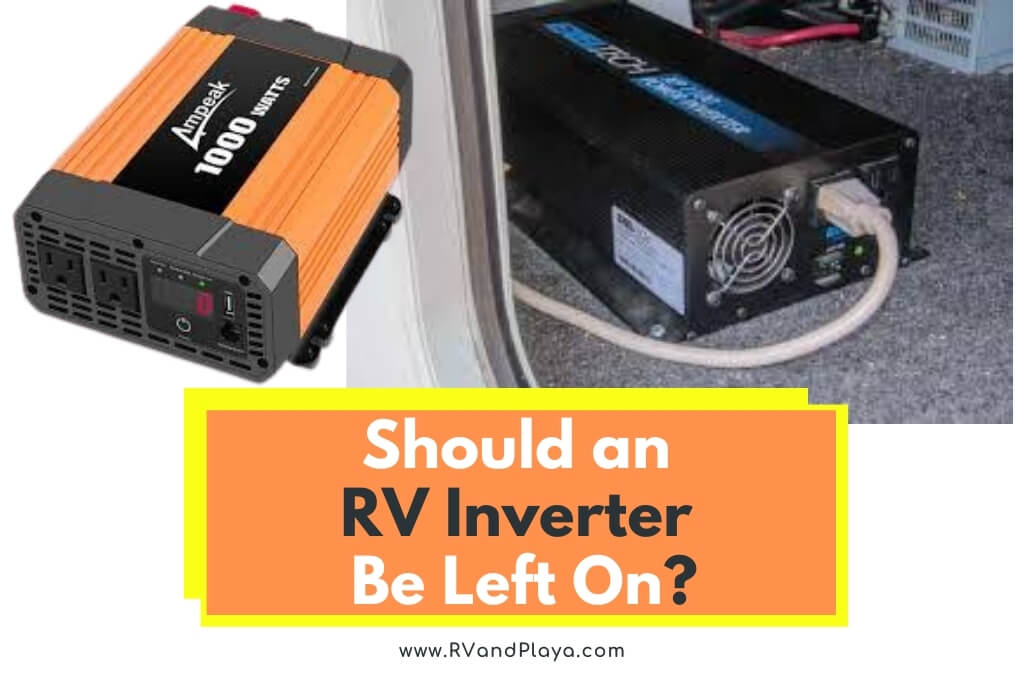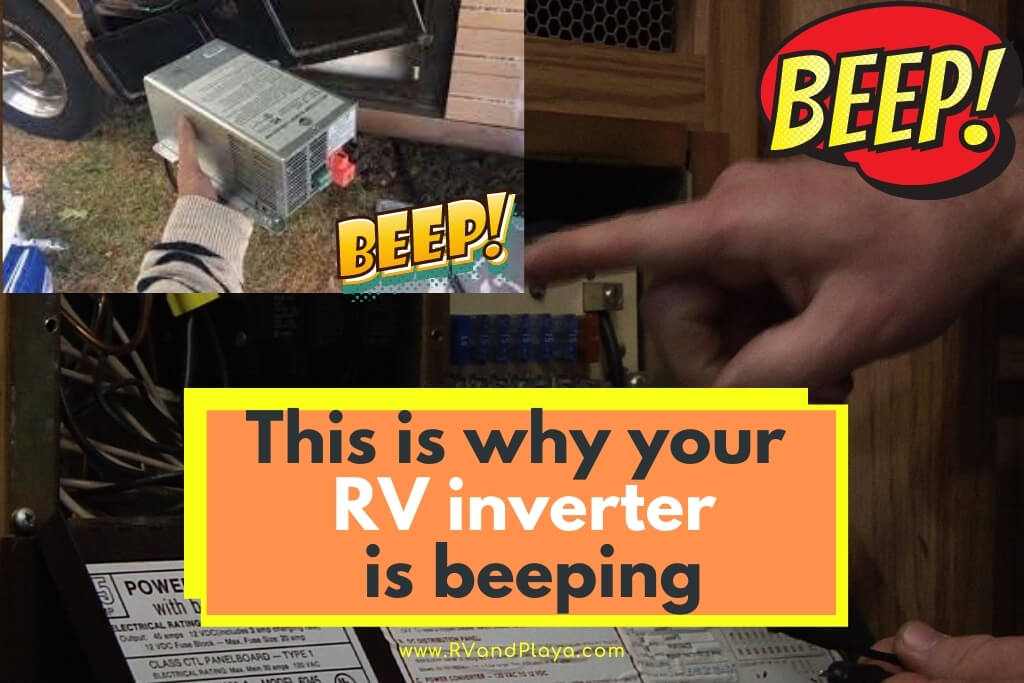If you want to get the most out of your RV’s electrical system, you’re probably wondering whether you should leave your inverter on at all times, or turn it off when it is not in use.
This may seem like a simple yes or no question, but like most queries involving technology, the answer is somewhat complicated.
Should an RV Inverter be left on? While it’s true that turning your inverter off can extend your battery’s lifespan, there are several scenarios such as using a dual unit or running a refrigerator that warrant leaving it on.
Whether or not you should leave your RV’s inverter on is heavily dependent on the following:
- the type of inverter you have
- what you are using it for
- how long you intend to use it this way.
If you would like to learn more about inverters and their uses, this is the article for you.
Below we have gathered information that should help you familiarize yourself with how inverters work, know what kinds of inverters there are, and determine whether or not you should keep yours on.
In no time at all, you’ll be ready to make the best choice for your RV.
Read also: Is it Bad to Leave Your RV Plugged in all the time?
Table of Contents
How Does an Inverter Work?
Before we delve into the reasons you should or should not keep your inverter on, it is a good idea to know exactly what an inverter is and what function it performs.
In short, an inverter is what allows you to plug AC devices into your RV. It does this by inverting the RV’s incoming DC (direct current) current into an AC (alternating current) current.
Related reading: What is an Inverter in an RV and Why Do You Need it?
With an inverter, you can plug in everything from your regular phone charger to a refrigerator.
This can be invaluable if you’re camping somewhere in your RV that doesn’t provide power and you still want to use some basic electric amenities, or if you’re going on a long trip and don’t want to have to make as many stops.
Power Inverters Explained – How do they work? >> Check out the video below:
Cases Where You Should Turn Off Your RV’s Inverter
In most cases, you’ll want to turn your inverter off when you’re not using the RV.
Below is a list of considerations that may lead you to conclude your inverter should in fact be turned off.
1. None of your devices require AC power
The whole point of an inverter is to convert DC power to AC so you can use household devices like microwaves and refrigerators.
If you don’t have any such devices onboard your RV yet, then you can cut back on energy consumption by turning off your inverter.
2. The manufacturer recommends you turn the inverter off
Oftentimes the answer to the question of whether or not you should leave your inverter on is contained within the inverters user manual.
Some manufacturers will recommend you turn off the inverter if you’re not using it to extend its lifespan. It’s also generally just a good idea to check the user manual before you do anything.
3. Extend your battery’s lifespan
Inverters unfortunately can drain your RV’s battery. If you’re turning the inverter off while the RV isn’t in use, this can help your battery to last longer than it otherwise would.
However, you should weigh this factor against other short term considerations like needing the inverter on to preserve food in your fridge.
Related reading: How Many Batteries Do I Need for My Inverter? [Incl. 8 Examples]
4. You have an older RV
Though this tip does not always apply, it is a good rule of thumb. Most older RVs do not have dual unit inverters and therefore will negatively affect the battery and inverter lifespan if they are left on.
We will discuss dual units and why they can be left on in a subsequent section.
Related: Does Your Travel Trailer Have an Inverter? Here’s How to Check
5. You are using a generator for AC power
Some generators have what is called an automatic start function built into them.
This means that when your RV is turned off it will kick on and keep your AC appliances going with its own source of power.
Using an automatic start function is a great way to get around the problem of having appliances like refrigerators or microwave clocks that need to stay on, without sacrificing some of your battery’s lifespan.
Cases Where You Should Leave Your RV’s Inverter On
Now that we’ve looked at cases where you should turn your RV’s inverter off, let’s turn our attention to those exceptions when you should leave it on.
Below is a list of some of the most common reasons you might leave your inverter on.
1. Your AC devices need constant power
Most commonly this will happen either because you are charging things like your phone or laptop overnight or you have a refrigerator with food inside that will go bad if it loses power. If your devices need continuity of power, it is a good idea to leave your inverter on.
Related reading: Can I Plug My 50 Amp RV into 110V or 220V? ( All You Need To Know)
2. Your settings will remain intact
Sometimes certain settings–like the clock on your microwave–depend on a constant stream of AC power. If it is important to you to keep those settings consistent, you’ll need to ensure your inverter is on so that AC power continues to flow.
Still, we don’t recommend doing this all the time because of the wear on your battery. This is more for a fixed amount of time when you’re really using your RV.
3. You have a new RV
The popularity of using dual units–which are designed to stay on–as an inverter has skyrocketed over the years.
Please note that you should still double-check whether or not your RV has a dual unit before leaving it on. This is because it is still possible to find new RVs with single inverters.
Related reading: Average RV Park Rates: Nationwide Campgrounds Prices per Nigh
4. You are using a dual unit
Dual units perform more functions than single inverters, as they contain both the RV’s inverter and converter-charger.
Because of what functions the converter performs, you’ll want to leave your dual unit on. In fact, dual units are really designed to stay on. We will discuss this in more detail in the following section.
What About Dual Units?
As alluded to above, dual units contain both the converter and inverter for your RV and are designed to stay on.
A dual unit actually charges your batteries by using shore power that comes from the inverter.
It is best to leave your dual unit on so that it can keep your batteries nice and charged for use.
It is important to emphasize that more and more RVs are being made with dual units already installed due to their growing popularity.
Again, it is a good idea to take a peek at that good ol’ user manual if you really want to know what is already installed in your RV.
The more you understand about the technology you are using, the more likely you are to make beneficial decisions while using it.
So, Should You Really Leave an RV Inverter On?
In most cases, it is best to turn off your inverter for the purpose of extending it and your battery’s lifespan. However, there are some instances where you should actually leave it on.
Most commonly if you have a dual unit, you’ll want to leave it on so it can do the job it is designed to do–namely charging your battery.
Remember to always check the user manual before determining how you should use any kind of equipment in your RV. You may find the answer you seek is right there in front of you.
It might sound like a cliche but the more you know the better off you’ll be. Once you have a clear picture of what you’re dealing with, you can enjoy a great trip no worries!
Recommended Reading:
This Is Why Your RV Inverter Is Beeping [Facts You Should Know]
Recent Posts
Is Toyota Remote Connect Free? (Subscription, Services Plans)
Does Toyota Remote Connect have an included trial? It used to be the case that, when you bought a new car, you made one straightforward payment and that was it. Now, it feels like there are...
Toyota Safety Connect: What It Is And Why You Need It? Whether you’re buying a new Toyota or you’ve had one for a while you will have been given the hard sell on their Connected Services but do...


